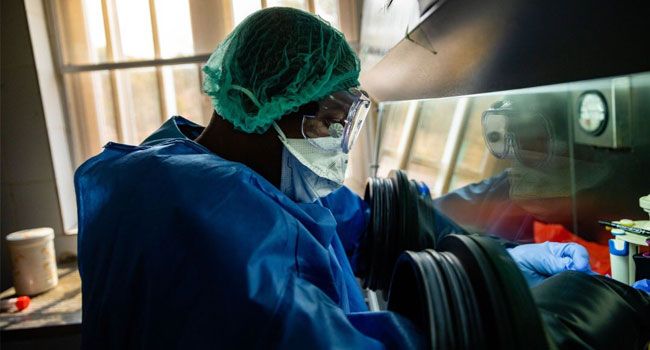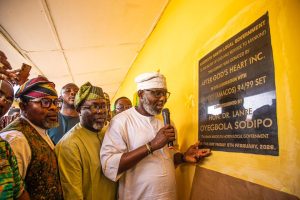
Men and women cluster around plastic wash basins hastily set up outside one of northeast Nigeria’s sprawling displaced persons’ camps, lathering their hands with soap under the gaze of security personnel.
The makeshift hygiene facilities are among urgent efforts aimed at warding off the spread of coronavirus among the 1.8 million people displaced across the region by the decade-long Boko Haram insurgency.
Northeast Nigeria has yet to register any confirmed infections, but aid workers fear the virus could rampage through the overcrowded camps — a catastrophe for a population already living on the edge.
Around the regional capital Maiduguri, hundreds of thousands are crammed into government-controlled camps or huddled in makeshift shelters at unofficial locations.
“This epidemic is scary, we ardently pray against it,” Aishatu Abubakar, a resident of the Bakassi camp housing 30,000 people, told AFP.
“It is a double calamity, we have been grappling with insecurity and now this disease has reared its head.”
Bunu Bukar Muhammad, co-founder of local charity Smile Mission Healthcare, has been trying to spread the word about coronavirus in the camp — setting up facilities and teaching people how to wash their hands correctly.
But he admits there are major challenges in the crowded conditions.
“Things like social distancing are quite difficult to adopt in this context,” he told AFP.
In a bid to prevent infections, the local authorities have banned all “visitors” from entering the camps they control.
But those living in the informal settlements that stud the city insist that not enough is being done.
“We have not received any aid at all,” said Umar Gwoza, who lives with his family at one of the unofficial sites.
“We are in need of hand gloves, face masks and hand sanitiser to protect ourselves.”
More than 10 years of jihadist rebellion has left northeast Nigeria in no state to deal with a global pandemic.
Only half of the roughly 700 health facilities in Borno state — the epicentre of the violence — are still working and many have been damaged by the fighting.
“There is no health system to contain that virus and the sick. It will spread like wildfire and affect all involved, including security,” said one United Nations worker on condition of anonymity.
“It is really scary.”
Those living in the camps are no strangers to the spread of diseases.
Cholera has broken out repeatedly and aid workers are falling back on their experience of dealing with other diseases to try to stave off coronavirus.
But an easily transmitted virus could prove devastating in the camps — even if the average age of the population is young.
“For the IDPs (internally displaced people), if they get infected and need more help they can’t get it,” the UN worker said.
“Their immune system will be easily compromised because of poor diet and other conditions like poor sanitation and lack of water. Their situation could be dire.”
AFP / Audu Marte The Bakassi camp houses thousands of people who have been displaced by Boko Haram’s brutal jihad – social distancing here is very difficult, say camp workers
The UN on Tuesday announced it was taking “emergency preparedness and response measures to mitigate the spread of coronavirus” among the most vulnerable people in the northeast.
That means ensuring supplies of clean water, helping to provide soap, launching media campaigns on the coronavirus and scrambling to bring in crucial equipment such as ventilators from overseas.
A medical source told AFP that in Borno state there are currently only 10 ventilators, which are needed for patients who are unable to breathe on their own because of lung damage caused by the virus.
“Our priority is to ensure the continuous delivery of life-saving assistance, especially health services,” Edward Kallon, the UN Humanitarian Coordinator in Nigeria, said in a statement.
“More than ever, it is crucial for vulnerable people to have access to not only water, soap, shelters, but also food, education and protection.”
— Damage to aid efforts? —
Beyond the nightmare scenario of a major outbreak in the camps, humanitarian organisations worry that global disruptions from the pandemic could soon hit efforts to reach the 7.1 million people in desperate need of assistance.
Nigeria — which by Thursday had confirmed 174 infections and 2 deaths from the novel coronavirus — has closed its borders and shut down international flights.
The government says humanitarian assistance will still get in and has pledged to provide those displaced with two months of food rations.
AFP / Audu Marte The pandemic has spurred concerns for the camp’s supply lines in the months ahead
But aid workers are concerned that the virus could see tighter official controls, donor funds going elsewhere and problems bringing in equipment and key personnel like the helicopter pilots who fly to remote locations.
The military already imposes stringent travel restrictions on aid groups.
Coupled with insecurity that saw 12 humanitarian workers killed in the region last year, the restrictions have left some 1.2 million people beyond the reach of aid groups.
“The northeast of Nigeria, where the big part of our operations is concentrated, is a highly unpredictable and volatile environment to work in,” Alyona Synenko, spokesperson for the International Committee of the Red Cross in Nigeria, told AFP.
“Restrictions, put in place to prevent the spread of the virus, add another layer of complexity on how we deliver humanitarian assistance.”




telegram中文版提供中文版本的Telegram下载。不仅有pc电脑桌面版,还有苹果手机和安卓APK版本可供选择。纸飞机app是一款超10亿用户的聊天应用,其卓越的安全性和稳定性深受用户青睐。